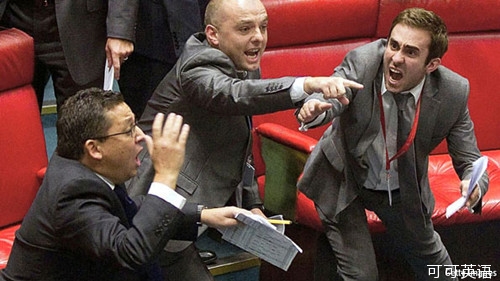Finance and Economics;The London Metal Exchange;Metal cashing;Who wants to buy the LME?
The sight of a pack of adults shouting at each other is rarely edifying. Unless, that is, the set-to is in the “ring” of the London Metal Exchange (LME), whose old-fashioned system of open-outcry trading does much to set global prices for industrial metals and which is now itself the subject of a bidding battle. Only Hong Kong Exchanges and Clearing had publicly said that it would submit an offer for the world’s leading metals exchange by this week’s deadline of May 7th, but CME Group, InterContinental Exchange and NYSE Euronext are also widely reported to be in the frame.
那群家伙聚在一起相互吼叫一點用都沒有,除非能在倫敦金屬交易所(LME)的“擂臺”上互毆一頓。LME老式的公開叫價貿(mào)易系統(tǒng)對全球工業(yè)金屬價格有著深遠的影響,但是現(xiàn)在LME已淪為競購的對象。在這周的截止日期之前(5月7日),只有香港交易所公開表示會對這個世界領先的金屬交易所提出報價,但芝加哥商業(yè)交易所、洲際交易所和紐約泛歐交易所的染指也諸見報端。

The member-owned LME, which started business 135 years ago in premises above a hat shop in the City of London, resolved last year to see what it might be worth to globalising rivals. As one of the world’s few remaining member-owned exchanges it is an inviting target, even at an estimated price of 1 billion Euro(1.6 billion dollar). Acquiring it would give all the likely suitors a bigger global footprint, important for any ambitious exchange group, and a ready-made business in non-ferrous metals, demand for which has rocketed on the back of China’s rise.
采用會員制的LME在倫敦的一家帽子店開業(yè)以來,已經(jīng)有了135年的歷史,在去年引發(fā)全球競爭也是理所應當,作為世界上僅剩的幾家會員制交易所之一,它自然是一塊誘人的大蛋糕,其估價甚至達到了10億英鎊(約合16億美元)。得到它能夠讓買家向全球化邁出更大的步伐,這對任何一個有雄心的交易所都是至關重要的,而且,面對中國經(jīng)濟的騰飛,各大競標機構就更想得到這個現(xiàn)成的有色金屬貿(mào)易機構。
But the bidders have a tricky balancing-act to pull off. To satisfy their own shareholders, they must seek out the ample opportunities to boost profits at the LME by shifting to centralised clearing, cutting costs, raising fees and introducing more electronic trading at the expense of open outcry. But this is unlikely to appeal to the LME’s members, which include some of the world’s biggest banks (JPMorgan Chase is its largest shareholder). The exchange makes meagre returns precisely because it has kept fees so low.
為了實現(xiàn)目標,競標者還要進行一些棘手的協(xié)調(diào)工作。為了讓股東滿意,他們必須利用各種機會來提高LME的紅利,比如改成中央清算方式、降低成本、提升會費和引進更多的電子交易系統(tǒng)以改變傳統(tǒng)的公開叫價方式。但是這些措施不大可能贏得會員的好感,包括世界上最大的幾個的銀行(摩根大通是最大的股東),而LME的盈利太少恰恰是因為會費太低了。
The LME may decide to carry on alone if a potential bidder cannot reassure its members over the changes they would introduce. But competition is hotting up. The Shanghai Futures Exchange, set up in 1999, traded around 300m contracts last year, twice as many as the LME, even if those in London are typically far bigger. The Hong Kong Mercantile Exchange is also set to launch a copper contract soon. Teaming up with a bigger exchange, which will bring more liquidity and some fresh thinking, is an idea worth shouting about.
如果潛在買家?guī)淼母淖儾荒艽蛳麜T的疑慮的話,LME可能會決定繼續(xù)獨自運營下去。但是現(xiàn)在的金屬交易市場競爭正日益加劇,1999年成立的上海期貨交易所在去年有著3億次的成交量,這是LME的兩倍(雖然LME的交易總額更大一些),并且香港商品交易所也開始準備試水銅期貨。能夠與更大的交易所聯(lián)手會帶來更多的流動資產(chǎn)和更加新穎的思路,而這些才真正值得他們爭吵的。











